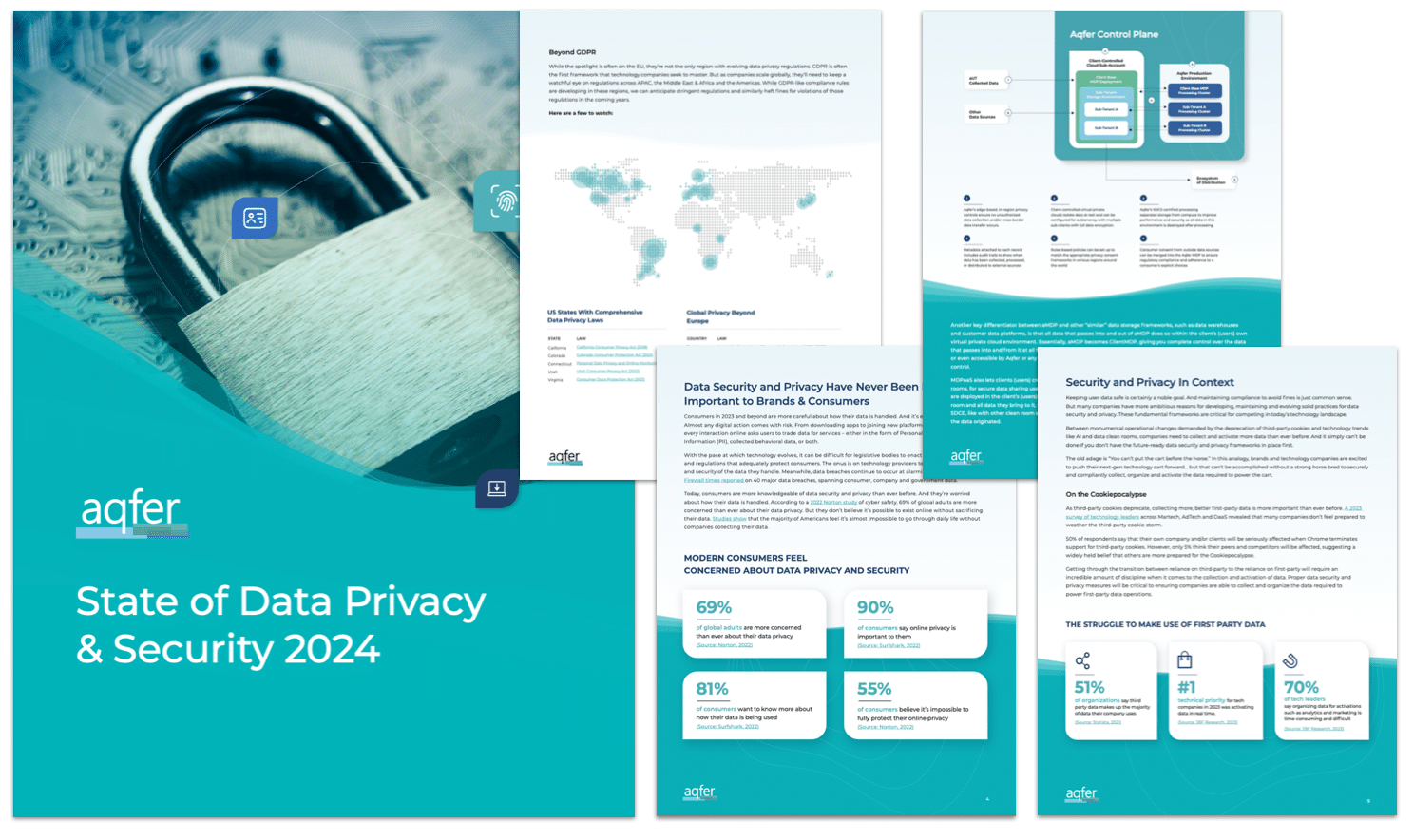×

×
Aqfer Insights
Stay on top of the latest trends in Martech, Adtech, and Beyond
Subscribe to follow the news on what’s happening in the marketing data ecosystem.
Unless you’ve been living under a rock, you’ve seen recent reports of billion+ dollar GDPR noncompliance fines for technology giants like Google and Meta. Data privacy and security have never been more important to consumers. And with astronomical fines on the line, the stakes have never been higher. As we enter the slow summer season, it’s a good time for your company to review your data privacy, security, and compliance practices.
By prioritizing data privacy and security best practices, technology companies can establish themselves as trustworthy partners who protect their customers’ sensitive information, even in fast-moving regulatory environments.
Today, data privacy standards change seemingly by the minute. General Data Protection Regulation (GDPR) rules and regulations are ever-growing. And while GDPR is now ubiquitous in Europe, regulations are evolving on a state-by-state basis here in the US as well. But GDPR isn’t the only concern when it comes to data protection and compliance.
Understanding and implementing best practices in data privacy and security is essential to protect customer data, maintain trust, and comply with regulations. Here are some key considerations for B2B technology companies:
Data privacy, security, and cross-border compliance are topics that our teams think about constantly. Perhaps that’s the influence of our CEO and founder, Daniel Jaye, who was part of the teams that pioneered digital privacy standards and technologies from the outset of the Internet.
As a result, Aqfer made privacy governance an intrinsic part of the DNA of our Marketing Data Platform-as-a-service. Strategic and tactical data use and governance are inseparable, thus Aqfer’s products are built around a proactive transactional privacy framework as opposed to the typical, more reactive administrative privacy governance. Essentially, we’re managing, governing, and auditing as part of the “data plane” versus the “control plane.”
Aqfer’s built-in privacy compliance framework provides clients with a cost-effective approach to tracking consumer behavior in a compliance-managed way that does not require expensive technical resources to manage, develop or support.
Privacy metadata is gathered as users set preferences while interacting with content and advertising. Aqfer’s platform maintains configurable rules for actively monitoring inbound data to confirm compliance.
First-party tag for collecting consent and limiting ID synchronization to consented activation partners.
APIs to support Right of Access and Right to be Forgotten
Automated rules to limit outbound transfers of data based on restrictions or lack of consent
Audit-ready: all privacy compliance metadata is embedded with customer data and collection/access events.
Aqfer Universal Tag (aUT) supports compliance with your organization’s data protection obligations. You or your client are the Data Controller, in GDPR terms, and Aqfer is the Processor (or a Sub-Processor if you are a Processor).
As global communities become more and more connected, governments are moving towards giving consumers more control over their own data. Given this landscape, it is vital to confidently identify and isolate individuals by location (ex. CA and EU) and comply with local privacy laws. With more privacy regulations coming in the future, marketers must know where their consumers are in real-time, and be able to manage that information in one central repository.
Strong centralized platforms capable of ingesting and activating first-party data are essential. With Aqfer, you can proactively bring compliance to the data versus reactively bringing data to compliance.
While this post has shared an overview of the privacy and compliance features within Aqfer’s Marketing Data Platform-as-a-Service, we’ve only just scratched the surface. We recently released a white paper that dives deep into today’s data privacy and security landscape. You’ll learn about evolving consumer and brand expectations around data privacy and security for the coming year. Expect to gain a better understanding of global data privacy regulations beyond GDPR and the importance of data privacy as it relates to industry trends like the cookiepocalypse, AI and data clean room development. Plus, the paper dives deep into privacy and security features built into Aqfer products
